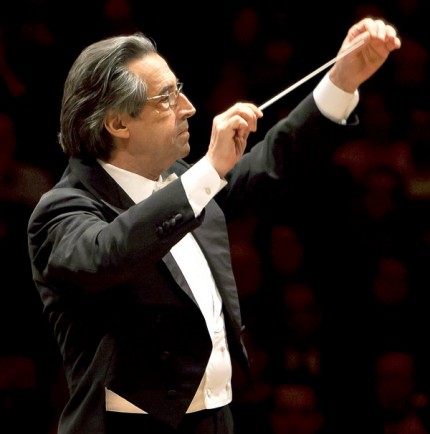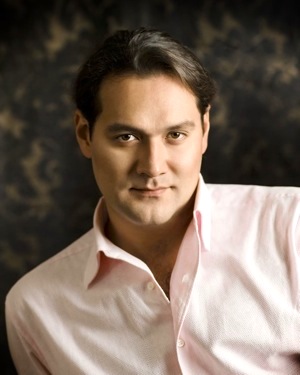Muti returns to CSO for shattering Shostakovich and triumphant Beethoven

Riccardo Muti is back in town to lead the Chicago Symphony Orchestra’s final two weeks of the season, the first program of which opened Thursday night.
Just 24 hours earlier, the CSO music director took on a different role, throwing out the first pitch at the Chicago Cubs game at Wrigley Field (scroll down for photo). The Cubs still lost, of course, to Detroit.
Muti’s presence sparked considerably more combustible results on home turf Thursday at Symphony Center. Beethoven’s not unfamiliar Fifth Symphony was the marquee draw, but, as is often the case, it was the totality of Muti’s program that made such an imposing impact with two rarities on the first half, both heard in their CSO premieres.
What looked on paper like something of a musical melange actually served up an intelligent linear program that reflected Muti’s humanistic principals: two crypto-protests against the Soviet Union followed by an exultant ode to human freedom with Beethoven’s Fifth.
The Meeting of the Volga and the Don was Prokofiev’s final work for orchestra. Written in 1951 to mark the completion of a canal that united the two title rivers, at 16 minutes the work hovers uneasily between a concert overture and tone poem. The warmly melodic theme for strings set against tinkling celesta could have come from the composer’s Romeo and Juliet ballet, but for the most part this is not primo Prokofiev with much of the work heavy-handed and reliant on sonic overkill.
Though, as Muti, indicated in his brief, witty post-performance comment, that seems to be the point. It’s hard to avoid the feeling that Prokofiev was being even more wryly subversive than usual in this enforced paean to Soviet construction—built largely with the labor of political prisoners. The satiric slant of the opening fanfare, the motoric chugga-chugga, and especially, the ceaseless, almost comical repetitions of the coda leave little doubt of Prokofiev’s distaste for this brand of public-works propaganda. Muti led the CSO in a refined yet big-boned performance that brought out all the heaving rhetoric and empty bombast.
Shostakovich’s Suite on Verses of Michelangelo Buonarroti inhabits a more private realm of expression, yet here too there is the clear sense of an artist struggling against malign external forces. Despite the title, this is an epic work, a 42-minute cycle of eleven songs for bass set to Michelangelo’s stanzas.
As with the composer’s late quartets and Viola Sonata—his final work—the feeling of a personal valedictory testament in these songs is unmistakeable. The composer told his son Maxim that he regarded these settings as his unnumbered last symphony, and the epigrammatic titles are centered on essential concerns of an artist’s life (“Truth,” “Love,” “Creativity,” “Night,” “Death”). Though written for large orchestra, many of the settings are crafted with economy, dependent upon dark winds and violas, cellos and basses. The predominant spare scoring reflects the inward, existential bleakness of the texts.

Ildar Abdrazakov, who made his CSO debut in the celebrated Verdi Requiem performances led by Muti in 2009 (and subsequent Grammy-winning recording) proved a masterful soloist. The Russian singer’s dark Slavic bass has a power and grainy quality that suits these gaunt introspective settings. Yet Abdrazakov also wielded his instrument with remarkable finesse, bringing a wide dynamic range and hushed tenderness to the final settings.
Muti’s meticulous balancing and structural command were at their finest in this vast work. Eleven slow, mostly despairing songs could easily turn deadly, but the long span was sustained with taut concentration and laser-like focus, with the belated outburst of “Creativity” making violent impact. Across all sections, the CSO played at their considerable finest for their Italian music director.
At this late juncture, what can any conductor do to bring freshness to Beethoven’s Fifth Symphony? We found out Thursday night, with the exhilarating performance delivered by Muti and the orchestra. The CSO’s music director pulled a Hans Schmidt-Isserstedt, whirling around and giving the downbeat before the applause had even stopped and it was off to the races from here.
This Beethoven Fifth had all the characteristic Muti virtues: burnished tonal refinement, laser-like precision and hair-trigger volatility. Tempos were consistently on the fleet side yet with the sonority having more muscle and punch than is heard from more pedantic, period-minded interpreters.
Yet even in this music, Muti illuminated the most familiar pages: an expressive nudge here, a rest held a bit longer than usual there, the light piquancy of the pizzicatos in the central section of the scherzo, and the horns cutting boldly through the textures throughout, with a frenzied intensity in the buildup to the triumphant coda.
The CSO played their collective hearts out for Muti, not least Eugene Izotov’s remarkable seamless oboe solo in the first movement. Only two performances left of this program and this is not one to miss, as much for the deep and magisterial Shostakovich as the combustible Beethoven.
The program will be repeated 8 p.m. Saturday and 7:30 p.m. Tuesday. cso.org; 312-294-3000.

Posted in Uncategorized





Posted Jun 15, 2012 at 8:32 pm by Tod Verklärung
It is not often that one reads a reference to Hans Schmidt-Isserstedt — a nice touch. I attended the Friday afternoon repeat of the Beethoven, which broadly fit your description of the previous performance without quite the intensity you describe. Not that the audience noticed. It appears that everyone has been convinced by the CSO’s marketing department and some agreeable critics (not including you) that Muti invented conducting. Indeed, I suspect the listeners could be persuaded that Muti would be a Cy Young Award winner for the Cubs if only he had the time. It is a shame that the ad effort has worked to get the Muti concerts sold-out, but not very many others. Once upon a time this town’s critics talked about such things, not to mention whatever artistic vision and planning the Music Director had in mind for the CSO. Not much of that anymore. It appears more and more that the role of music criticism is too often expected to be cheer leading. The Cleveland Plain Dealer’s former critic, who got forced out of his job because he was too tough on their Music Director, probably would agree.
Posted Jun 16, 2012 at 6:24 pm by Andrew Patner
Well, Pseudonymous, who *are* these “agreeable critics”? And are you disingenuously omitting Mr Johnson from your nonsensical charge because he is the only one of us who lets you make childish scratches on a wall without signing your name? What a crock.